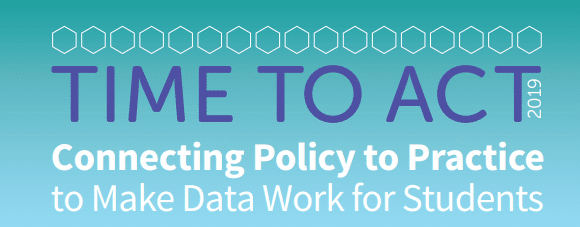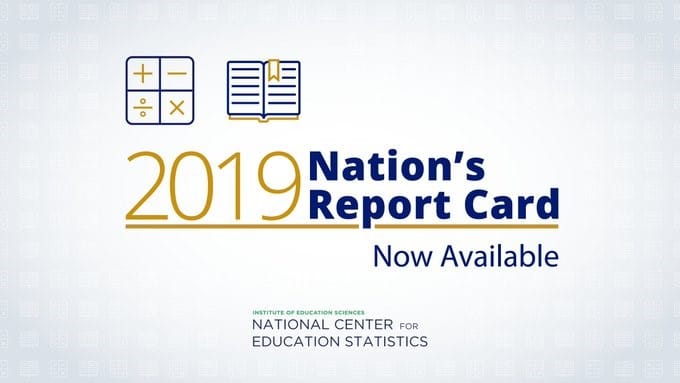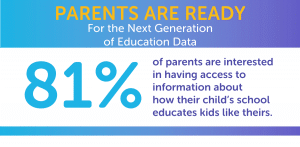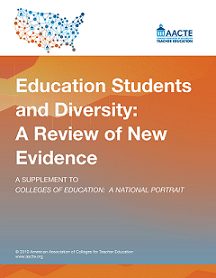19 Jan2021
By Meg Kamman and Tim Neubert
 The American Association for Employment in Education (AAEE) is requesting AACTE members’ participation in the 2020-2021 Educator Supply and Demand Survey, conducted in conjunction with the Center for Marketing & Opinion Research, LLC (CMOR). Both AAEE members and non-members are invited and encouraged to participate.
The American Association for Employment in Education (AAEE) is requesting AACTE members’ participation in the 2020-2021 Educator Supply and Demand Survey, conducted in conjunction with the Center for Marketing & Opinion Research, LLC (CMOR). Both AAEE members and non-members are invited and encouraged to participate.
With data and perceptions gathered from colleges, universities, and school systems over several decades, the report generated will provide you and your institution with valuable regional and national insights and trends in PK-12 educator supply and demand. An electronic version of this report will be provided to all respondents in Spring 2021 at no cost.
Completion of the survey should take about 15 minutes and all responses will remain confidential.
Preview questions (in PDF format) prior to survey completion.
College or University? Complete this survey.
School District? Complete this survey.
23 Oct2020
By Margaret Caspe
 Decades of research confirm the importance of families, schools, and community working together to launch students on successful trajectories. Yet, teachers attribute lack of preparation as one of their greatest barriers to building relationships with families and their greatest fear for failure. As a result, in January of 2020, the National Association for Family School and Community Engagement (NAFSCE) partnered with AACTE, CAEP, MAEC, the NEA, and selected faculty and state leaders to form the Pre-Service Family Engagement Consortium to enhance how educators are prepared to engage families and communities.
Decades of research confirm the importance of families, schools, and community working together to launch students on successful trajectories. Yet, teachers attribute lack of preparation as one of their greatest barriers to building relationships with families and their greatest fear for failure. As a result, in January of 2020, the National Association for Family School and Community Engagement (NAFSCE) partnered with AACTE, CAEP, MAEC, the NEA, and selected faculty and state leaders to form the Pre-Service Family Engagement Consortium to enhance how educators are prepared to engage families and communities.
27 Aug2020
By Stacey Eidson
 While the turnover rate among new teachers is close to 50% across this country, that is not the case with graduates of Augusta University’s College of Education.
While the turnover rate among new teachers is close to 50% across this country, that is not the case with graduates of Augusta University’s College of Education.
About 93% of the graduates from the College of Education at Augusta University remain in the profession for at least 5 years or more.
In addition, the College of Education has experienced a 100% job placement rate for its graduates who remained in Georgia since 2014, according to the Georgia Professional Standards Commission.
“Looking at those two data points together, we really buck the national trend,” said Judi Wilson, dean of the College of Education at Augusta University. “Here, in the College of Education, we work extremely hard to prepare our students for the classroom. Our students get more field experiences than some programs around the state and certainly many programs around the nation. I think that makes a tremendous difference.”
Education students at Augusta University receive practical, hands-on experience inside local schools so they can properly gauge if they are a good fit for the profession, she said.
17 Aug2020
By Barbara McKenna

Learning Policy Institute’s (LPI) new study, Measuring Student Socioeconomic Status: Toward a Comprehensive Approach, discusses the limitations of the popular measure and examines alternatives for state policymakers who are seeking to accurately count students from low-income families.
“Changing how we measure and address student poverty is more important than ever,” said LPI Senior Researcher Peter Cookson, who authored the study. “A shift away from the [federal Free and Reduced-Price Lunch] FRPL [program] measure was already long overdue and taking place in some states. This takes on deeper urgency now as learning for a generation of students has been upheaved by the COVID-19 pandemic. Accurately measuring family incomes is necessary if policymakers are to allocate school resources that meet the educational needs of students.”
26 Jun2020
By Blair Mann
Parents and teachers have had to deal with unprecedented challenges during the COVID-19 pandemic, but their demand for data is as strong as ever. The Data Quality Campaign’s (DQC) fifth parent poll and third teacher poll—conducted by The Harris Poll—makes clear that, especially during these uncertain times, parents and teachers value data. DQC’s national polls found that parents overwhelmingly want more information to support student success and teachers want more data on how the COVID-19 crisis has affected student learning—but teachers also want training and resources to use that data effectively. As state leaders pursue efforts to restart school in the fall, state policymakers and school leaders must take action to give parents and teachers the information and resources they need to ensure their students succeed.
“While the pandemic causes uncertainty in and out of schools, we know that parents and teachers want data and need more support to use it to help their students succeed,” said Data Quality Campaign President and CEO Jennifer Bell-Ellwanger. “As state and district leaders prepare for instruction to resume—whether it’s in person, virtual, or a hybrid—they must prioritize getting parents the information they need and ensuring that teachers have both the data they need and the tools to use it. Taking steps toward both of these goals will ensure that those closest to students have the data they need to make decisions that best serve students.”
Parents see the value of data. They want more data to understand the effects of school closures on student learning in their communities and to inform recovery efforts to best meet students’ and families’ evolving needs.
11 Mar2020
By Jacqueline E. King, Ph.D.
The 2018 Teaching and Learning International Survey (TALIS) released by the Organisation for Economic Co-operation and Development (OECD) covers about 260,000 teachers in 15,000 schools across 48 countries and economies.
The survey found that 67% of U.S. teachers under age 30 claimed teaching was their first career choice, consistent with the average for all participating countries. However, more than 73% of young teachers in Finland and close to 80% of young teachers in Alberta, Canada said teaching was their first choice. Moreover, 85% of young teachers in Japan and over 90% of young teachers in South Korea indicated teaching was their first-choice career.
Positive findings are that teachers in the United States are more likely to have received formal preparation on teaching students with special needs and on teaching in multicultural and/or multilingual settings, and feel better prepared in those areas than their peers in other OECD countries.
06 Dec2019
By Katrina Norfleet

The new Data Quality Campaign (DQC) annual report, Time to Act 2019, underscores that the most effective state efforts to improve student outcomes don’t exist in a silo; they cut across multiple policy priorities to make data work for students. The report, released this week, highlights that state policymakers—state education agency leaders, state boards, legislators, and executive leadership—must prioritize investments in data access and use.
DQC’s policy priorities provide a framework to organize action that supports K-12 student achievement and emphasize that people must have the data they need to answer questions and take action. DQC outlines the following four priorities for states:
- Measure What Matters. Be clear about what students must achieve and have the data to ensure that all students are on track to succeed.
- Make Data Use Possible. Provide teachers and leaders the flexibility, training, and support they need to answer their questions and take action.
- Be Transparent and Earn Trust. Ensure that every community understands how its schools and students are doing, why data is valuable, and how it is protected and used.
- Guarantee Access and Protect Privacy. Provide teachers and parents timely information on their students and make sure it is kept safe.
12 Nov2019
By Katrina Norfleet
 The recent release of the 2019 Nation’s Report Cards for mathematics and reading in grades 4 and 8 illustrates a growing disparity in achievement between the highest and lowest achieving students. The results show the divergence is happening across the nation, across states, and for student groups by race/ethnicity and socioeconomic status.
The recent release of the 2019 Nation’s Report Cards for mathematics and reading in grades 4 and 8 illustrates a growing disparity in achievement between the highest and lowest achieving students. The results show the divergence is happening across the nation, across states, and for student groups by race/ethnicity and socioeconomic status.
The National Assessment of Educational Progress (NAEP), widely known as the Nation’s Report Card, provides data from the nation, states/jurisdictions, and urban school districts that volunteer to participate in the Trial Urban District Assessment (TUDA). Approximately 296,900 fourth- and eighth-grade students across the nation participated in the 2019 mathematics assessment and nearly 294,000 fourth- and eighth-grade students across the nation participated in the 2019 reading assessment. Results are available for the 50 states, the District of Columbia, and Department of Defense schools, as well as for the 27 participating large urban districts.
27 Sep2019
By Jane E. West

This blog post is written by AACTE consultant Jane West and is intended to provide update information. The views expressed in this post do not necessarily reflect the views of AACTE.
It’s been a breathtaking week in Washington as minute-to-minute developments unfold in the House’s decision to pursue impeachment of President Trump. Yet, both congressional bodies continue to move on their legislative agendas. The question becomes, how much oxygen will impeachment suck up and will there be any space left for anything else? And remember the Congress leaves town today for a two-week recess, to return with less than 30 legislative days scheduled before the end of the year! Of course, this could change.
18 Sep2019
By Danny Ryan

The Organization for Economic Co-operation and Development’s (OECD) work on education helps individuals and nations to identify and develop the knowledge and skills that drive better jobs and better lives, generate prosperity, and promote social inclusion.
Access to OECD Education data
Through the OECD data portal, educators can cross-reference data on teacher’s salaries, graduation rates, education spending, and much more. All data is available to download for free.
For example, are you curious about how education policies support students, teachers, and principals? The OECD’s new Education Policy Outlook reports on the progress of over 200 school improvement policies implemented over the last 10 years.
School and University leaders will find a treasure trove of information within the OECD Teaching and Learning International Survey (TALIS), which asks teachers and school leaders about working conditions and learning environments at their schools to help countries face diverse challenges.
For those wanting further OECD insight, the OECD iLibrary contains nearly 20,000 content items related to education. Content on the platform is accessible to all by clicking the READ or WEB icon. Certain features and access is restricted to intuitions that have a subscription. Find out if your institution is an existing subscriber.
11 Sep2019
By Katrina Norfleet
The just released 2019 Data Quality Campaign (DQC) National Poll reports that those closest to students—parents and teachers—are eager for leaders to take actions that reflect a bold vision of data use to improve student outcomes in K–12 and beyond. The findings, released on September 10, show that 90% of parents say they need data to understand their child’s progress and help them do their best. Of the teachers who were polled, 86% believe using data is an important part of being an effective teacher.

In the brief, Parents are Ready for the Next Generation of Education Data, data show that parents believe student journeys don’t end with K–12. Parents see
05 Apr2019
By Shanett Dean

Data is a central and essential element in the work of scholar-researchers. Big data or data sets with information too sizeable or intricate for traditional statistical software, can be particularly challenging to analyze. Some students may be yet unaware of the nuances of big data and how it can inform their research. Additionally, others may wonder where to start or find sources for big data that can yield helpful insights for their work.
If you would like to increase your working knowledge of what big data is, where to find it, and how it can grow your analysis, Florida Atlantic University’s (FAU) Holmes Scholars invites you to attend “The Story of BIG DATA with All the Small Details” presented by Charles Dukes. This dynamic presentation on the mammoth data sources that are ubiquitous to our lives will not only provide participants with context and approaches for understanding big data, attendees will leave with a viable research agenda useful for their careers as social science researchers.
The presentation will take place on April 10, 2019 at 2:30 p.m. EST. If you are interested in video-conference attendance please RSVP for access to join us via Skype at http://bit.ly/HolFAU.
For more information, please contact me at sdean13@fau.edu.
02 Apr2019
By Katrina Norfleet

The “Data Systems” Deeper Dive session, held during the AACTE 2019 Annual Meeting examined the possibilities and challenges for using information and evidence-based research to improve teacher education programs. The discussion was led by moderator Robert Floden, dean of the College of Education at Michigan State University, and included four panelists: Kevin Bastian, senior research associate, University of North Carolina (UNC) and director, Teacher Quality Research Initiative Education Policy Initiative at Carolina (EPIC); Charles Peck, a professor of teacher education and special education at the University of Washington; Suzanne Wilson, Neag School of Educatin Endowed Professor of Teacher Education at the University of Connecticut (UConn); and Gladis Kersaint, dean, Neag School of Education at UConn.
The robust discussion opened with Bastian sharing the details of a two-pronged study conducted by EPIC that pairs student teaching data with workforce outcomes. He stated, “The problem we’re interested in addressing is how can programs take a mountain of performance assessment data and identify what we might call actionable evidence within it.”
26 Feb2019
By AACTE
 (February 26, 2019, Washington, D.C.) – Education Students and Diversity: A Review of New Evidence, an issue brief released today by the American Association of Colleges for Teacher Education (AACTE), provides new information on student diversity in U.S. colleges of education. As a supplement to AACTE’s signature report, Colleges of Education: A National Portrait, the new issue brief draws from a recently released U.S. Department of Education survey—The National Postsecondary Student Aid Study. It examines the characteristics of students working toward bachelor’s and master’s degrees in education, compares these students to the general student population, and identifies key differences by race/ethnicity.
(February 26, 2019, Washington, D.C.) – Education Students and Diversity: A Review of New Evidence, an issue brief released today by the American Association of Colleges for Teacher Education (AACTE), provides new information on student diversity in U.S. colleges of education. As a supplement to AACTE’s signature report, Colleges of Education: A National Portrait, the new issue brief draws from a recently released U.S. Department of Education survey—The National Postsecondary Student Aid Study. It examines the characteristics of students working toward bachelor’s and master’s degrees in education, compares these students to the general student population, and identifies key differences by race/ethnicity.
The issue brief presents newly available data on the following topics for education students in bachelor’s and master’s degree programs:
- Personal characteristics
- Family circumstances
- Parental education
- Financial status
- Employment
- Attendance patterns
12 Feb2019
By Jacqueline E. King, Ph.D.

One of the most striking findings of AACTE’s signature report, Colleges of Education: A National Portrait, is the lack of diversity among education students, particularly at the bachelor’s and master’s degree levels. Education Students and Diversity: A Review of New Evidence draws from a recently released U.S. Department of Education survey to examine the characteristics of students working toward bachelor’s and master’s degrees in education, to compare these students to the general student population, and to identify key differences by race/ethnicity.
The issue brief, which will be available for free download as an exclusive AACTE member benefit later this month, presents newly available data on the following topics for education students in bachelor’s and master’s degree programs:
- Personal characteristics
- Family circumstances
- Parental education
- Financial status
- Employment
- Attendance patterns
 The American Association for Employment in Education (AAEE) is requesting AACTE members’ participation in the 2020-2021 Educator Supply and Demand Survey, conducted in conjunction with the Center for Marketing & Opinion Research, LLC (CMOR). Both AAEE members and non-members are invited and encouraged to participate.
The American Association for Employment in Education (AAEE) is requesting AACTE members’ participation in the 2020-2021 Educator Supply and Demand Survey, conducted in conjunction with the Center for Marketing & Opinion Research, LLC (CMOR). Both AAEE members and non-members are invited and encouraged to participate.






 Decades of research confirm the importance of families, schools, and community working together to launch students on successful trajectories. Yet, teachers attribute lack of preparation as one of their greatest barriers to building relationships with families and their greatest fear for failure. As a result, in January of 2020, the National Association for Family School and Community Engagement (NAFSCE) partnered with AACTE, CAEP, MAEC, the NEA, and selected faculty and state leaders to form the
Decades of research confirm the importance of families, schools, and community working together to launch students on successful trajectories. Yet, teachers attribute lack of preparation as one of their greatest barriers to building relationships with families and their greatest fear for failure. As a result, in January of 2020, the National Association for Family School and Community Engagement (NAFSCE) partnered with AACTE, CAEP, MAEC, the NEA, and selected faculty and state leaders to form the  While the turnover rate among new teachers is close to 50% across this country, that is not the case with graduates of
While the turnover rate among new teachers is close to 50% across this country, that is not the case with graduates of 

 The recent release of the 2019 Nation’s Report Cards for mathematics and reading in grades 4 and 8 illustrates a growing disparity in achievement between the highest and lowest achieving students. The results show the divergence is happening across the nation, across states, and for student groups by race/ethnicity and socioeconomic status.
The recent release of the 2019 Nation’s Report Cards for mathematics and reading in grades 4 and 8 illustrates a growing disparity in achievement between the highest and lowest achieving students. The results show the divergence is happening across the nation, across states, and for student groups by race/ethnicity and socioeconomic status.




 (February 26, 2019, Washington, D.C.) –
(February 26, 2019, Washington, D.C.) – 